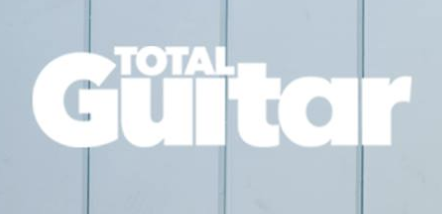The FX files: Roland Space Echo
We consider the definitive tape echo
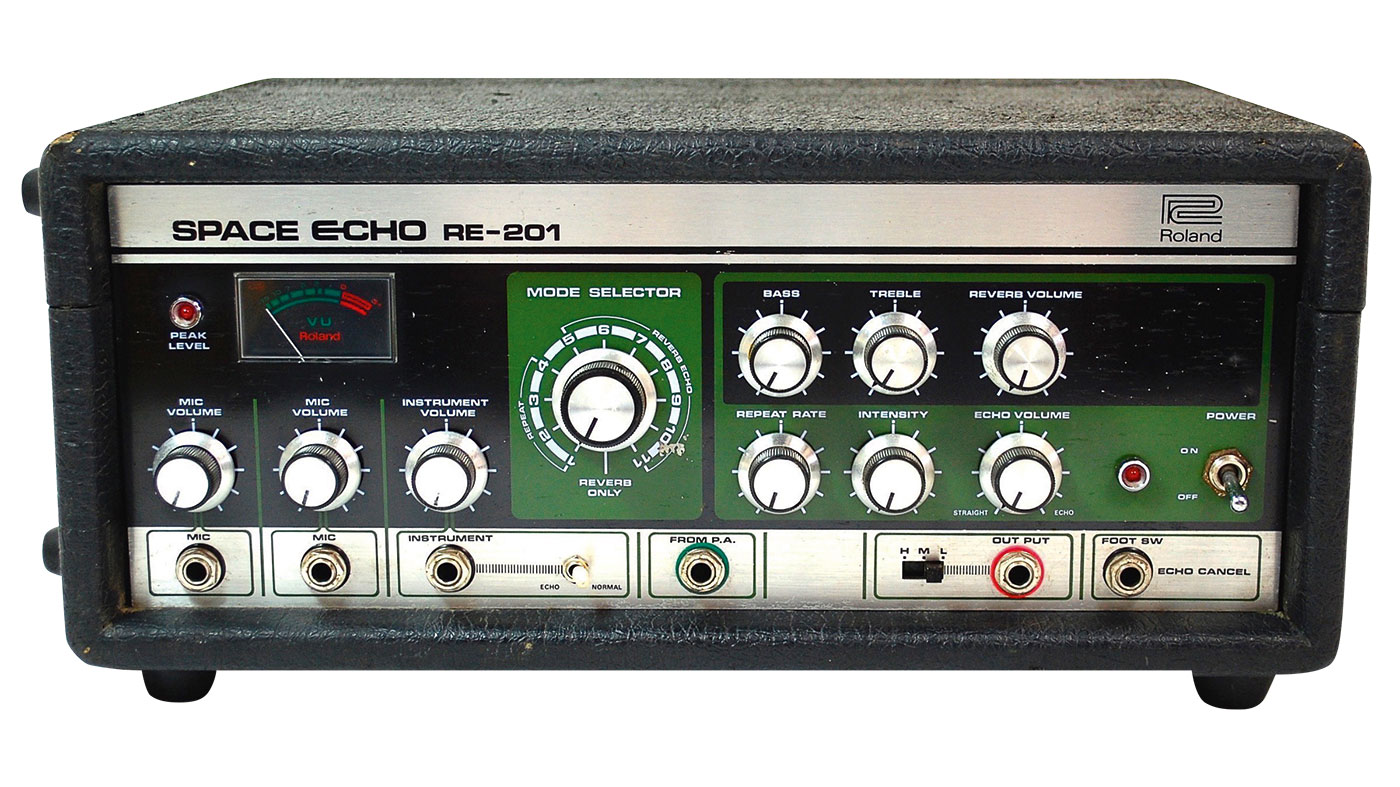
The classic RE-201 Roland Space Echo expanded horizons on account of its unique sounds, and its name signposted players to where it could take them.
Introduced in 1974, the RE-201 is arguably the definitive model in the Roland Space Echo line, although it was preceded by the RE-100 and RE-200 the year before.
The RE-201 was a runaway success, and according to Roland’s official website, was produced until 1990, although most of the units we’ve seen were built considerably earlier.
The 100 series was a slimmed-down version in the same enclosure with a slightly different fascia, and crucially, no spring reverb.
The RE-201 has been used by Sonic Youth, Radiohead and Pink Floyd amongst many others
The RE-201 had extra controls for the reverb, with a reverb mix as well as additional EQ controls for bass and treble. Widely used in everything from prog to dub, the RE-201 has been used by Sonic Youth, Radiohead and Pink Floyd amongst many others.
Being a fully analogue device, it has a number of quirks. The most obvious is the ‘wow and flutter’ caused by slight variations in the motor speed, which causes the delay speed to change.
Even a unit in perfect condition will not produce perfect delays, and with the erratic, imperfect nature of the chorusing, smooth delay is genuinely impossible to recreate perfectly. In addition, the analogue tape as a transmission medium, combined with the added EQ of the preamp, gave the input signal a warm, saturated sound.
Get the MusicRadar Newsletter
Want all the hottest music and gear news, reviews, deals, features and more, direct to your inbox? Sign up here.
Beyond quirks are the reasons that the tape echo unit fell out of grace. The units were prone to jamming, tape had to be replaced, motors could burn out and parts could fail. With so many moving parts, it’s no surprise that the maintenance burden of the Echo was, for many, too much hassle.
Mic/instrument volume
Like many standalone effect units, the Space Echo series had a dedicated preamp. This, then, is the control for the level of preamp gain that is added. It might not be as famous as the preamp on the Echoplex EP3, but the Space Echo is used for its preamp in studios around the world, and live by guitarists like Nick Zinner and Brian Setzer.
Repeat rate & mode
Contrary to what you might expect, the large central knob isn’t repeat rate, but mode; selecting one of several repeat lengths. Repeat rate does exactly what you’d think. Once a mode has been selected, this repeat rate control then acts as a trim for the speed of the repeats. What’s perhaps most satisfying is that as the entire mechanism is analogue, turning this knob changes the speed of the motor, audibly, if you’re close to the unit.
Intensity
Comparable to a feedback control, this changes the number of repeats.
Echo volume
This control can be read as a blend for the relative level of the echo repeats to the clean signal. Depending on your guitar and pickups, it will usually need some tweaking, but it’s not madly sensitive.
Output level
Depending on the model, the output level will probably be a three-way toggle switch, with H-M-L (high, medium, low) settings. The optimum setting will depend on whether it’s going directly into an amp or into other pedals.
Under the influence
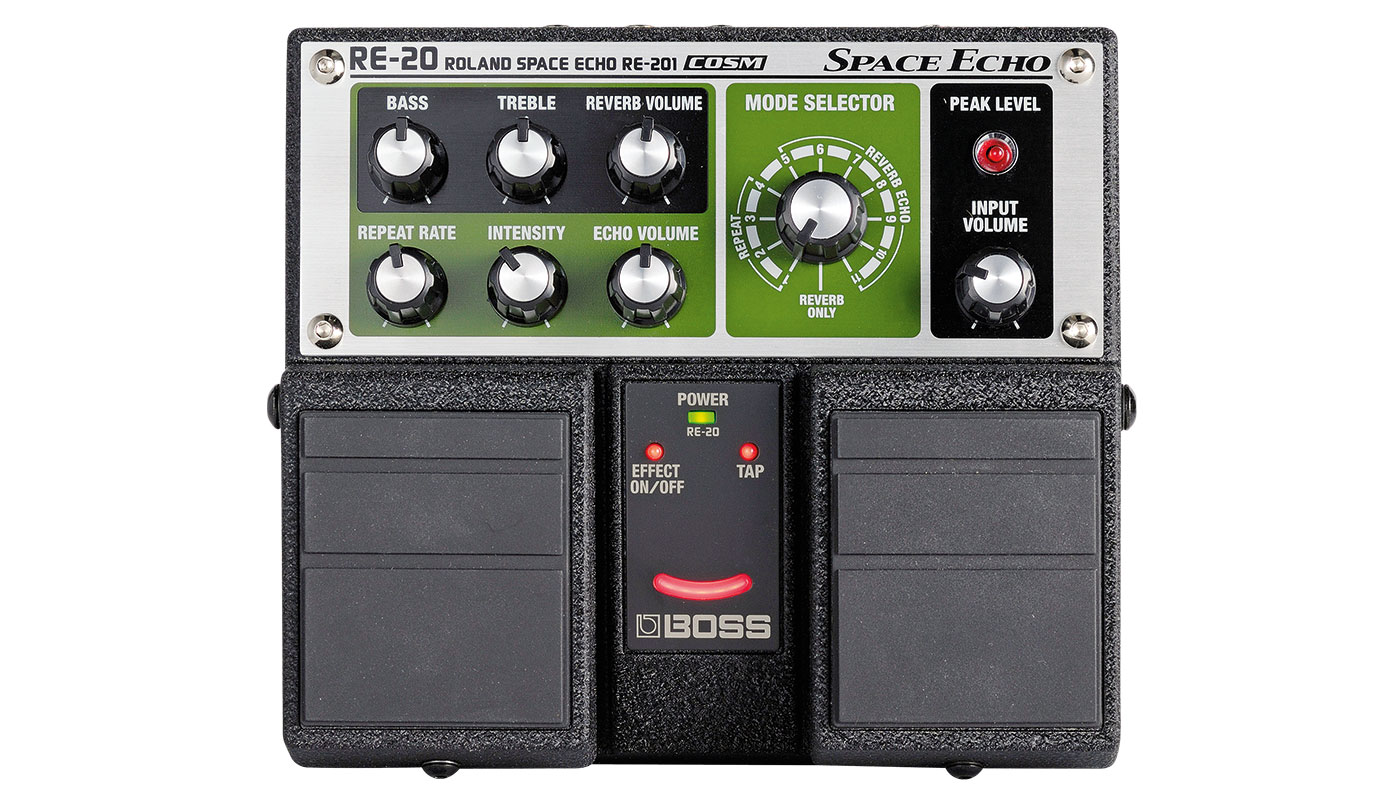
Boss RE-20 Space Echo
£184
The RE-20 is marketed as being the definitive emulation of the Roland Space Echo, and there’s no denying it looks the part. Besides the obvious convenience and lack of maintenance required, it also has a second footswitch that can be used to control tap tempo, as well as repeat rate and intensity.
The only drawback is that the DSP isn’t as powerful as Boss’s flagship DD-500, so if aesthetics aren’t everything, the DD-500 offers better emulation and more versatility.
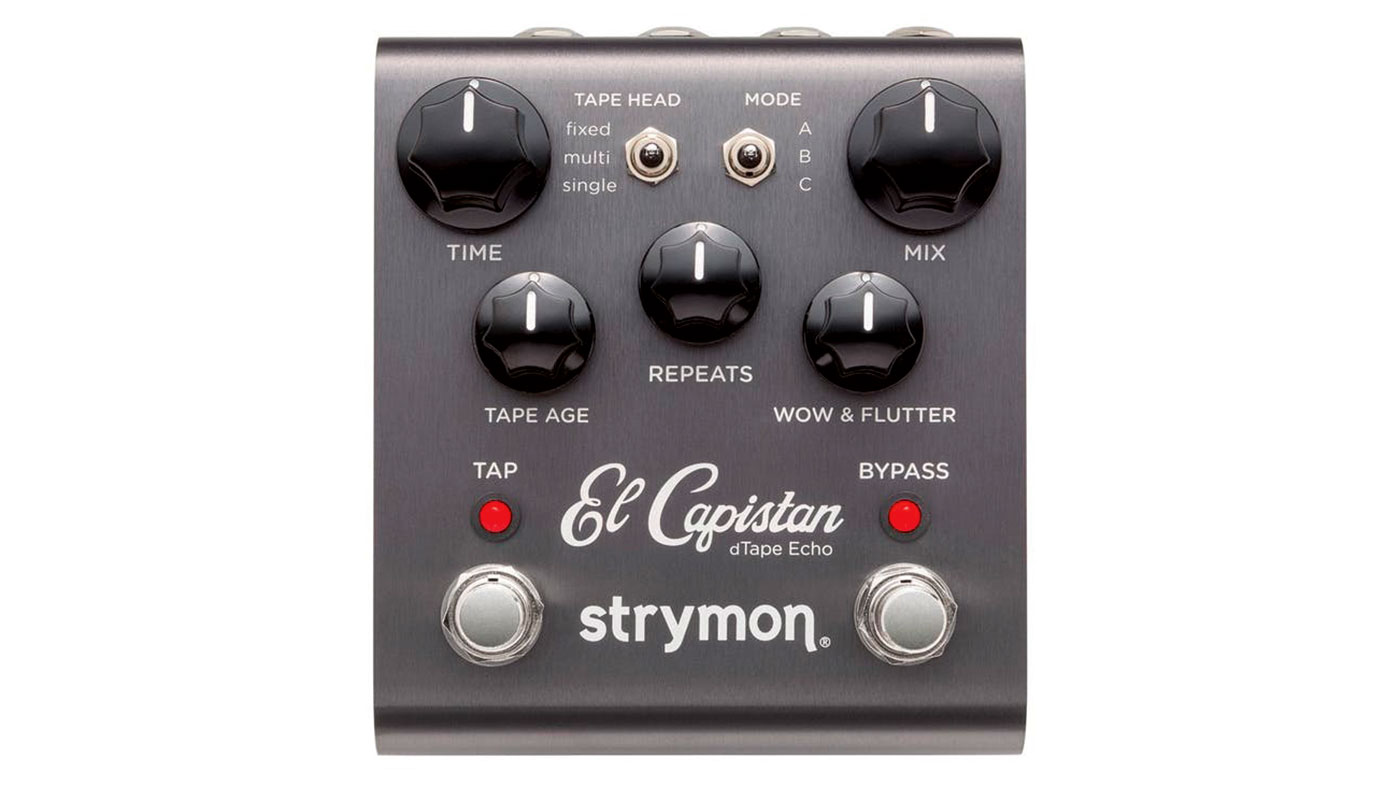
Strymon El Capistan
£264
The Strymon El Capistan is presumably a pun on the El Capitan granite monolith, and the capstan wheel found inside the RE-series of tape echoes, but whatever the origins of the name, it’s without doubt a hell of an echo unit; the benchmark against which tape emulations should be judged.
Offering features not found on the originals, like tap tempo and easy magnetic head count switching, it also includes models of the Binson Echorec and Echoplex as well.
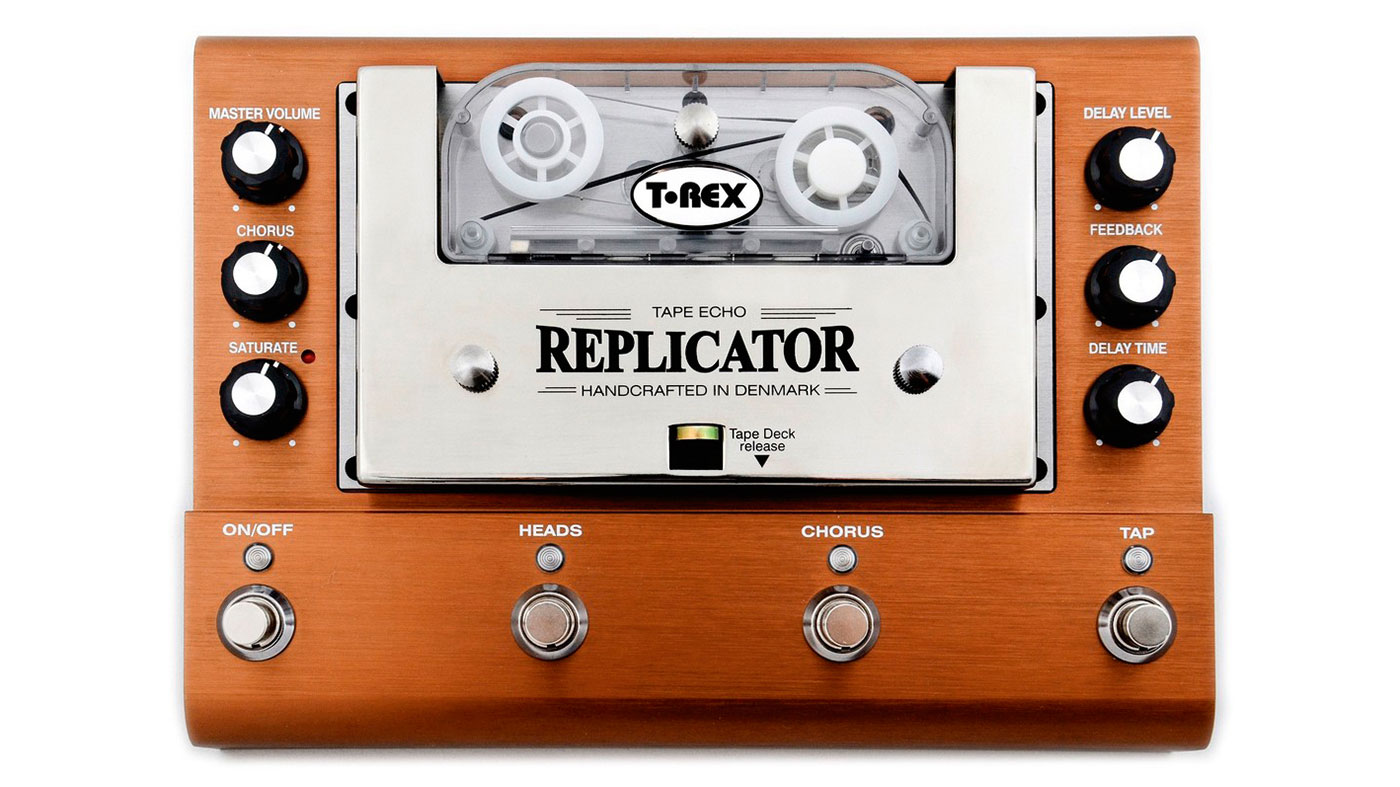
T-Rex Replicator
£659
The T-Rex Replicator is a diminutive marvel, a pedal that aims to be a fully-functional tape echo with no maintenance required, on account of being built around a cassette.
Not only are these self-contained cassettes more sturdy than the loops of tape found in classic tape echo units, but hopefully they will be easier to keep in production for replacements in the future. There’s a stripped-down Junior version available too, at nearly half the price.
Classic tones
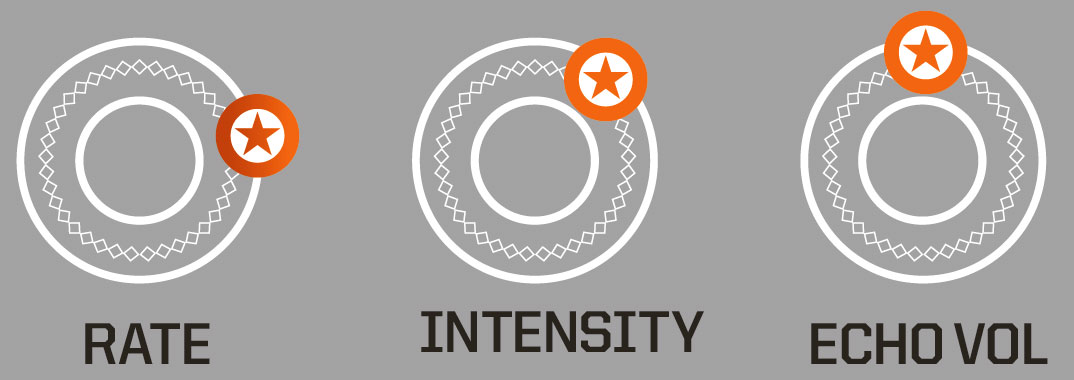
Get the tone #1: country slapback
Depending on the speed of the song you’re playing, you’ll need to alter the exact repeat rate setting to taste, but this should get you in the general area for the 100 series. With the 200, consider taking off some bass, adding some treble, and adding in just a little bit of reverb blend for country bliss.
Mode: short
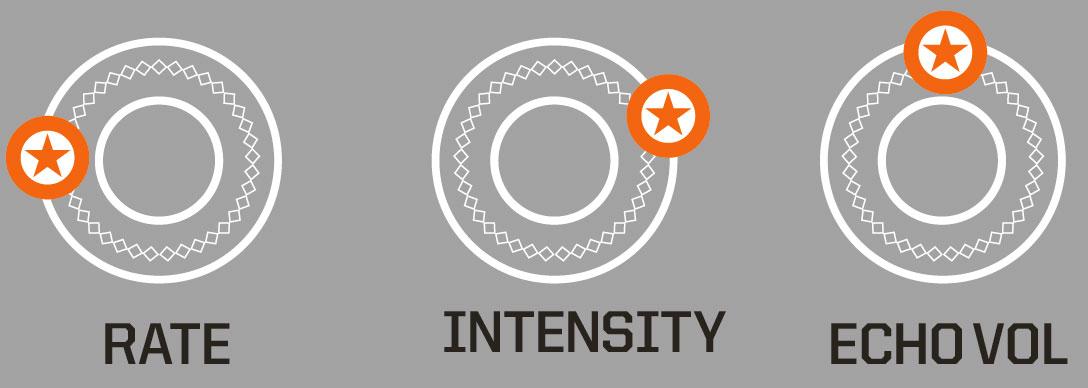
Get the tone #2: washy post-rock
Look at the feet of many post-rock guitarists, and you’ll see some kind of tape echo emulation pedal. The natural chorus caused by the ‘wow and fl utter’ of the motor and tape, combined with the darker repeats is mesmerising. If you have a 2XX unit, consider rolling off some treble and bass, and adding in some reverb as well.
Mode: long
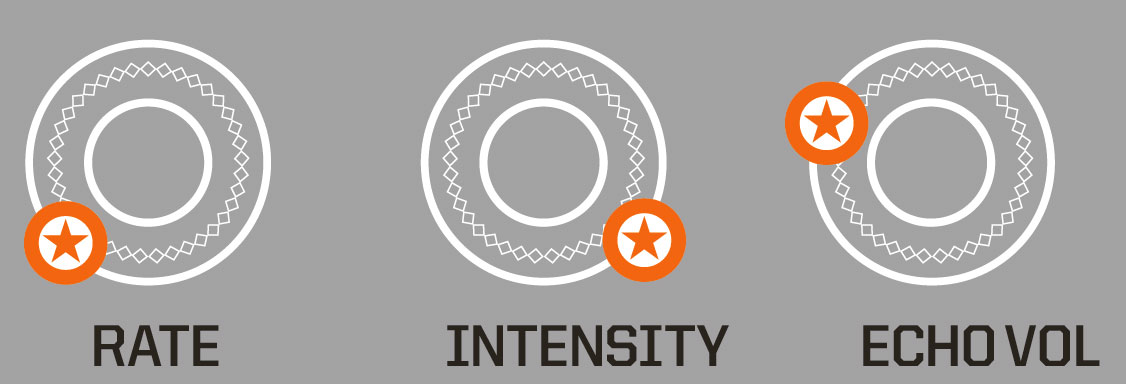
Get the tone #3: ambient swells
By swelling the guitar in using a volume pedal or the pot on your guitar, you’ll have a great tool for creating pad-like textures for intros, outros, breakdowns or as a studio effect. With the repeat rate set to its longest setting and intensity up, you might need to pull these back - depending on your unit, it might start to auto-oscillate.
Mode: long
Total Guitar is Europe's best-selling guitar magazine.
Every month we feature interviews with the biggest names and hottest new acts in guitar land, plus Guest Lessons from the stars.
Finally, our Rocked & Rated section is the place to go for reviews, round-ups and help setting up your guitars and gear.
Subscribe: http://bit.ly/totalguitar
“A pedal that sings with harmonic richness and blooming touch response”: Tone King offers up boutique tube amp tones for your pedalboard with the Imperial Preamp
“Each and every unit is perfectly dialled in to the 'sweet spot' that can be so elusive to find in vintage pedals”: Pigtronix’s Gas Giant is a high-gain fuzz pedal with a FET-driven onboard noise gate


